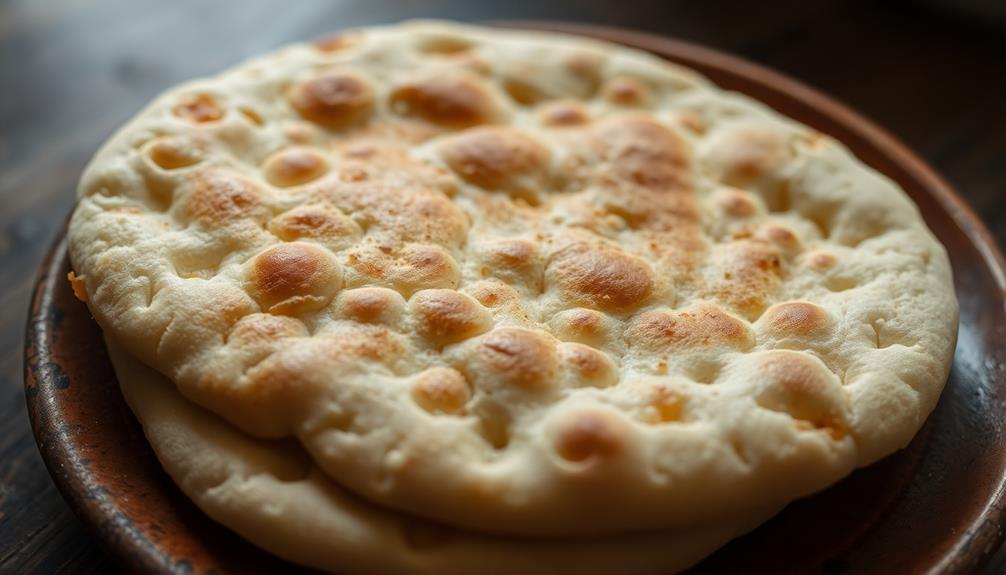The Ethiopian coffee ceremony is a meaningful tradition that showcases hospitality, respect, and community. You start by roasting green coffee beans over an open flame, then grind them manually in a mortar and pestle. The brewed coffee is served in small cups, often in the presence of family or friends, symbolizing connection and patience. By continuing, you’ll discover how each step reflects Ethiopia’s rich cultural values and the deeper significance behind this cherished ritual.
Key Takeaways
- The Ethiopian coffee ceremony is a cultural ritual symbolizing hospitality, respect, and community bonding.
- It involves roasting, grinding, and brewing coffee manually to preserve tradition and authenticity.
- The ceremony emphasizes patience, mindfulness, and deliberate preparation, reflecting cultural values.
- Serving coffee in small cups fosters social bonding and invites shared participation among participants.
- Overall, the ceremony celebrates connection, history, and Ethiopia’s rich cultural heritage beyond just coffee.

Have you ever experienced the rich tradition of an Ethiopian Coffee Ceremony? If not, you’re missing out on more than just coffee; you’re missing a deep cultural experience. This ceremony is a crucial part of Ethiopia’s cultural traditions, symbolizing hospitality, respect, and community. It’s not just about drinking coffee—it’s about connecting with others, sharing stories, and honoring age-old customs. When you participate, you’ll notice the deliberate coffee preparation process that emphasizes patience and respect for tradition. Every step, from roasting the beans to serving the brew, reflects a cultural significance that’s been passed down through generations.
Experience Ethiopia’s rich cultural tradition through the deliberate, respectful coffee ceremony symbolizing hospitality and community.
The process begins with roasting green coffee beans over an open flame or hot pan, allowing you to witness the transformation from raw to aromatic. This isn’t hurried; it’s a mindful activity that requires your attention and care. As the beans turn a rich brown, you’ll notice the fragrant aroma fill the air, signaling that the coffee is ready for the next step. The beans are then ground using a traditional mortar and pestle, emphasizing the importance of manual effort and tradition. Unlike modern coffee makers, this step connects you directly to centuries of cultural practices, where each grind is a ritual of respect. Manual coffee grinding is an integral part of preserving the authenticity of the ceremony. Incorporating this traditional technique also helps support local artisans and preserves cultural heritage. Additionally, the manual process fosters a sense of connection and mindfulness that modern methods often lack.
Once the coffee is ground, it’s brewed in a special pot called a jebena, often made of clay. The brewing process is slow and deliberate, allowing the flavors to develop fully. You might observe that the ceremony involves multiple rounds, with each serving carefully poured into small cups. The entire coffee preparation is a communal event, often taking place in the presence of family or friends, fostering a sense of unity. The ceremony isn’t rushed; it’s an invitation to pause and savor the moment. The serving of coffee is more than just a gesture—it’s an act of hospitality that welcomes others into your space and your life.
Throughout the process, you’ll notice that every step is infused with cultural traditions that highlight respect, patience, and communal bonding. The Ethiopian Coffee Ceremony, thus, isn’t merely about caffeine intake; it’s a sacred ritual that exemplifies the country’s rich social fabric. When you partake in it, you’re not just drinking coffee—you’re experiencing a living tradition that celebrates connection, history, and shared values. Engaging in this ceremony also allows you to observe community bonding and shared hospitality at its finest. This tradition emphasizes the importance of cultural preservation, ensuring that these meaningful practices endure for future generations.
Frequently Asked Questions
What Are the Origins of the Ethiopian Coffee Ceremony?
You might wonder about the origins of the Ethiopian coffee ceremony. It began centuries ago as a traditional way for communities to celebrate and strengthen social bonds. The process of coffee brewing during the ceremony reflects hospitality and respect. By participating, you engage in a rich cultural practice that fosters connection. This ritual has evolved over time but still plays a essential role in Ethiopian social life and communal bonding.
How Does the Ceremony Vary Across Different Ethiopian Regions?
Like a tapestry woven with regional threads, Ethiopian coffee ceremonies vary across different regions. You’ll notice distinct customs and unique coffee preparation techniques that reflect local traditions. In some areas, the ceremony emphasizes communal storytelling, while others focus on meticulous roasting methods. These regional nuances create a rich mosaic of cultural expression, inviting you to experience Ethiopia’s diverse heritage through each aromatic cup, revealing the soul of each community’s cherished customs.
What Are Traditional Foods Served During the Ceremony?
During the coffee ceremony, you’ll enjoy traditional snacks like popcorn and roasted barley, which complement the rich coffee aroma. You might also sample cultural desserts such as honey bread or sweetened bread called dabo. These treats enhance the communal experience, reflecting Ethiopia’s rich culinary heritage. Sharing these traditional foods deepens your appreciation for the ceremony’s cultural significance, making the gathering more warm and memorable.
How Has Modernization Affected the Coffee Ceremony?
Modernization has brought a significant technological impact on the coffee ceremony, making it more accessible but also risking cultural preservation. You might notice digital recordings and social media sharing that spread the tradition globally, yet some authentic elements could be lost. While technology helps preserve the ceremony’s importance, it’s essential to balance innovation with respect for its cultural roots to keep the tradition alive for future generations.
Are There Specific Occasions When the Ceremony Is Performed?
You’ll find that the Ethiopian coffee ceremony is often performed during formal gatherings and religious events. It’s a cherished tradition, bringing people together to celebrate special occasions or mark important moments. Whether it’s a wedding, a community meeting, or a religious holiday, this ceremony enhances the sense of unity and respect. Participating in or witnessing the ceremony during these occasions deepens your appreciation for Ethiopia’s rich cultural heritage.
Conclusion
As you experience the Ethiopian coffee ceremony, you’ll find it’s like stepping into a warm, welcoming embrace. This tradition isn’t just about coffee; it’s about connection, hospitality, and honoring centuries of culture. By participating, you become part of a rich tapestry woven with history and community. Just as a cozy fire brings people together, this ceremony creates a space where stories are shared and bonds are strengthened, making every sip a meaningful moment.









